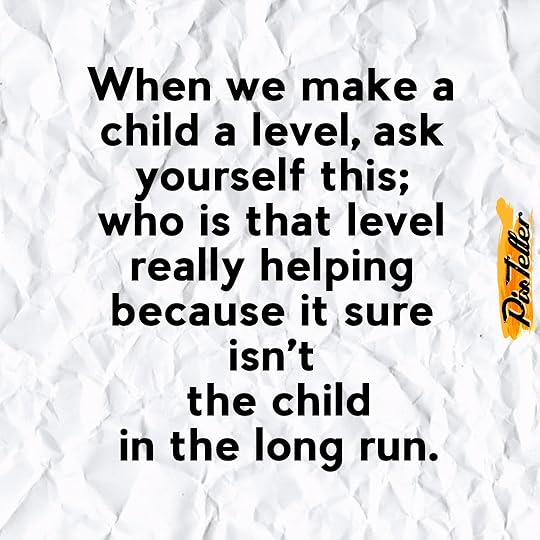When We Make a Child a Level

Pardon my passion for a moment, but a few things need to be said.
When we make a child a level we diminish the entire child. Levels tell a child that they are not worth us getting to know them. That we don’t have time to take the time we need to help them better. That their entire reading identity is the same as every other child that is at that level.
When we make a child a level, a letter, or a number, we are telling them that that is all they need to know. That that is all we need to know. That they do not know how to shop for books, that they can rely only on outsiders who have determined what is best for them. Thet their level speaks for them and that our conversations need to be about comprehension and skills, rather than who they are as readers.
When we make a child a level, we can teach more. We can do more. We can match kids up more easily. We can rely on others to do the hard work of getting to know the very child that is in front of us and help them discover who they are as readers, as human beings. And we can go home, lulling ourselves into thinking that we actually helped that child by telling them to only pick from certain levels of books because that is what the research told us to do.
But that is not what our reading instruction is only about. It was never JUST about matching kids to text. It was never JUST about finding the right fit book. It was never JUST about 99% comprehension rates, good fit books, or the five finger rule. It was never just about the quick solution or the short-term fix. In our obsession with getting things done, we have forgotten that it takes time to develop a reader, it takes time to become a reader, it talkes trial and error, and it takes discovery. Levels can take that away from us all.
It is about discovering why reading matters. Why reading makes us better human beings. Why they should leave our classrooms, our schools, and find more books so that they can continue to wonder, to search, and to feel something.
So when we make a child a level, ask yourself this; who is that level really helping because it sure isn’t the child in the long run.
PS: I was quoted today in a discussion piece in School LIbrary Journal, about how leveling disempowers children, other smarter people are quoted as well.
If you like what you read here, consider reading my newest book, Passionate Readers – The Art of Reaching and Engaging Every Child, out August 2017. This book focuses on the five keys we can implement into any reading community to strengthen student reading experiences, even within the 45 minute English block. If you are looking for solutions and ideas for how to re-engage all of your students consider reading my very first book Passionate Learners – How to Engage and Empower Your Students. Also, if you are wondering where I will be in the coming year or would like to have me speak, please see this page.
Filed under: Be the change, being a teacher, Literacy, Reading, Reading Identity





